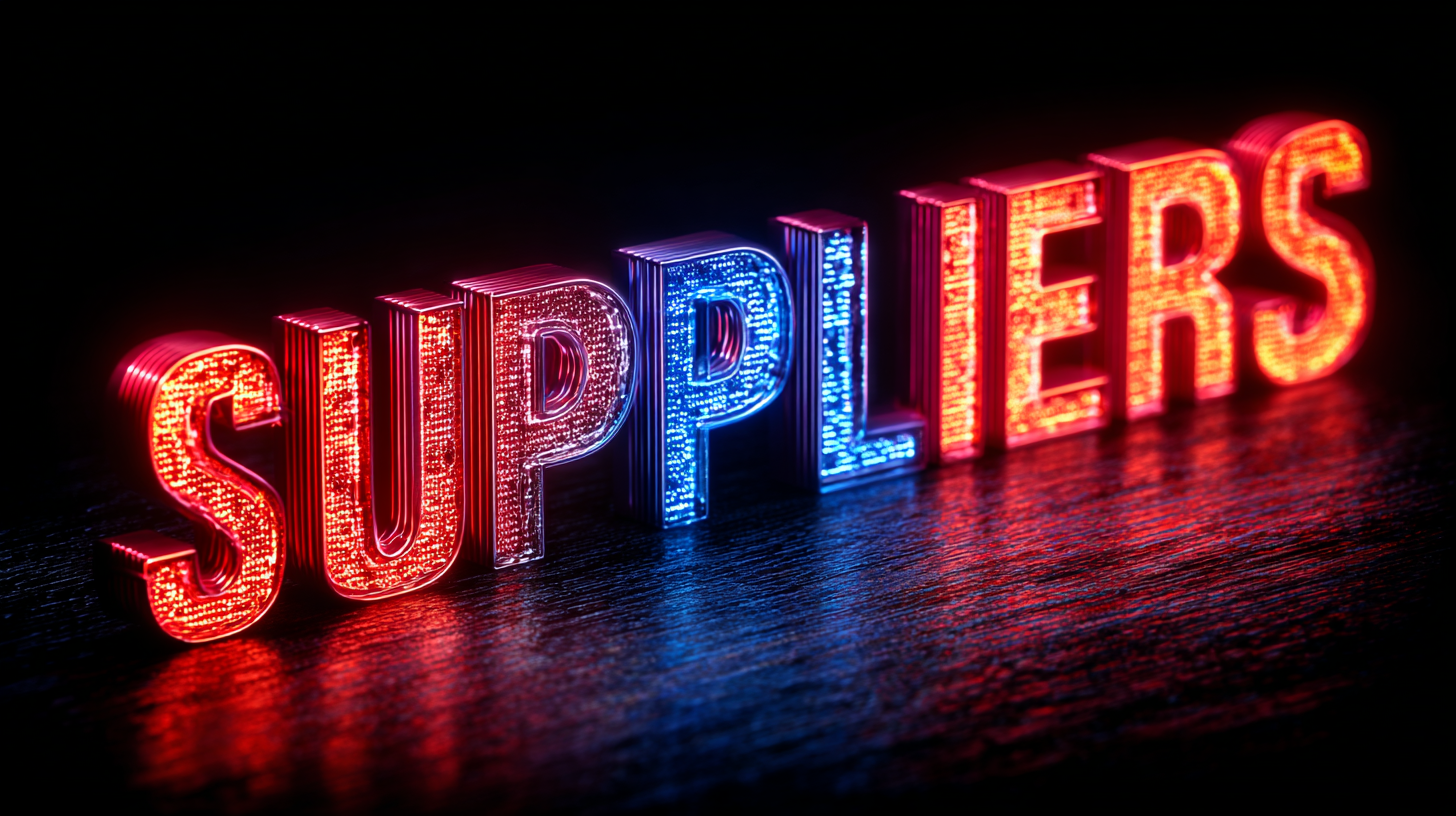
Unlocking the Future of Sourcing Best Suppliers in 2025 with Cutting Edge Industry Insights
In the rapidly evolving landscape of global commerce, sourcing the best suppliers in 2025 will be driven by cutting-edge industry insights and technological advancements. According to a recent McKinsey report, businesses that leverage data analytics in their supplier selection process can improve performance by up to 30%. Additionally, Deloitte's findings highlight that organizations prioritizing sustainable sourcing practices are not only meeting consumer demand but also enhancing their competitive edge, with sustainability efforts correlating with a 20% increase in customer loyalty. As companies navigate the complexities of a post-pandemic economy, understanding the technology trends influencing supplier dynamics, such as automation, artificial intelligence, and blockchain, will be crucial. This blog aims to explore these advancements and provide actionable strategies for businesses looking to unlock the potential of their suppliers in 2025.

The Evolution of Supplier Sourcing: Embracing Digital Transformation in 2025
As we navigate through 2025, the evolution of supplier sourcing is increasingly defined by digital transformation. Businesses are embracing advanced technologies to streamline procurement processes, enhance supplier collaboration, and improve decision-making. According to a report by McKinsey, companies that leverage digital tools in their sourcing strategy are experiencing up to a 20% increase in overall efficiency and a reduction in procurement costs by as much as 15%. These statistics underscore the necessity for organizations to adapt to technological advancements in the sourcing landscape.
Moreover, the rise of data analytics and artificial intelligence (AI) is reshaping how businesses identify and evaluate suppliers. A recent study by Gartner found that organizations implementing AI-driven supplier assessments reported a remarkable 30% improvement in the quality of supplier selection. This shift enables companies to make more informed choices, anticipating supply chain disruptions and optimizing their vendor relationships. Embracing these digital solutions is no longer an option but a critical component for sourcing best suppliers and ensuring a resilient supply chain in today's competitive market.

Key Technologies Shaping Supplier Selection: AI, Blockchain, and Big Data
The landscape of supplier selection is rapidly transforming, driven by advancements in key technologies such as AI, blockchain, and big data. According to a recent report by Gartner, 80% of sourcing professionals believe that artificial intelligence will be fundamental in expediting the supplier evaluation process by 2025. AI tools enable firms to analyze vast amounts of supplier data, making it easier to identify risks, assess performance, and enhance decision-making. The predictive analytics offered by AI not only streamline operations but also foster more strategic partnerships by aligning supplier capabilities with business needs.
In tandem with AI, blockchain technology is set to revolutionize transparency and trust in supply chains. A study by Deloitte indicates that 40% of companies are expected to adopt blockchain in their supply chain operations by 2025, allowing for secure and traceable transactions. This technology provides an immutable ledger of supplier activities, which can significantly reduce fraud and ensure compliance with regulations. Moreover, big data analytics empowers organizations to glean insights from complex datasets, enhancing their ability to source suppliers who not only meet immediate needs but also align with long-term sustainability goals. As these technologies coalesce, businesses can expect a more efficient, transparent, and responsible sourcing process in the coming years.
The Importance of Sustainability: Why Eco-Friendly Suppliers Matter in 2025
As we approach 2025, the importance of sustainability in sourcing suppliers becomes increasingly paramount. Eco-friendly suppliers are not just a trend; they represent a critical shift in how businesses operate within a globally conscious marketplace. Companies are now recognizing that partnering with suppliers who prioritize environmentally friendly practices can significantly enhance their brand reputation and foster customer loyalty. In an era where consumers are more informed and selective about their choices, businesses that align with sustainable practices can differentiate themselves from competitors and appeal to a growing demographic that values environmental responsibility.
The integration of sustainability into sourcing strategies also reflects a broader commitment to corporate social responsibility. By choosing eco-friendly suppliers, companies can reduce their carbon footprint, minimize waste, and contribute to the preservation of natural resources. This not only benefits the planet but can also result in long-term cost savings through improved efficiencies and reduced regulatory compliance costs. As we move further into 2025, organizations that embrace sustainability in their supply chains will be better positioned to navigate challenges and capitalize on opportunities in a rapidly evolving market.
The Importance of Sustainability: Eco-Friendly Suppliers in 2025
Building Stronger Partnerships: Collaborative Approaches to Supplier Relationships
In today's rapidly evolving marketplace, the importance of fostering strong partnerships with suppliers cannot be overstated. Collaborative approaches to supplier relationships not only enhance efficiency but also pave the way for innovation and mutual growth. Emphasizing open communication and shared goals allows organizations to align their objectives with those of their suppliers, creating a synergy that can lead to improved product offerings and market responsiveness.
Building a robust partnership requires a proactive strategy that integrates both parties into the decision-making process. Regular engagement through joint workshops, strategic planning sessions, and performance reviews encourages transparency and deepens trust. By utilizing data analytics and shared insights, companies can anticipate challenges and collaboratively develop solutions, ensuring that both supply chain and customer needs are met. This partnership not only maximizes resource utilization but also allows businesses to stay ahead of industry trends, ultimately unlocking new avenues for growth and success in 2025 and beyond.
Unlocking the Future of Sourcing Best Suppliers in 2025 with Cutting Edge Industry Insights - Building Stronger Partnerships: Collaborative Approaches to Supplier Relationships
| Supplier Category | Average Lead Time (Days) | Quality Rating (1-5) | Collaboration Level (1-5) | Sustainability Score (1-10) |
|---|---|---|---|---|
| Electronics | 15 | 4.5 | 4 | 8 |
| Textiles | 30 | 4.0 | 5 | 7 |
| Automotive | 45 | 4.3 | 4 | 6 |
| Food & Beverage | 10 | 4.8 | 5 | 9 |
| Construction | 60 | 3.9 | 3 | 5 |
Data-Driven Decision Making: Leveraging Insights for Optimal Supplier Choices
In an era where data-driven decision-making is paramount, sourcing the best suppliers requires a strategic approach grounded in comprehensive insights. According to a report by McKinsey, organizations that systematically utilize data analytics in their procurement processes can reduce costs by up to 20%. This shift allows companies to transition from traditional sourcing methods to more informed and strategic choices, thereby enhancing their competitive edge in the market.

Leveraging industry insights becomes essential in 2025 as the landscape of supplier selection evolves. A study by Deloitte indicates that 59% of procurement professionals believe that advanced analytics will significantly reshape their supplier evaluation methods. By harnessing predictive analytics and real-time data, businesses can better assess supplier performance and reliability, leading to optimal supplier choices that align with their long-term goals. This focus on data not only mitigates risk but also fosters stronger partnerships with suppliers who exhibit consistent performance and innovation.
